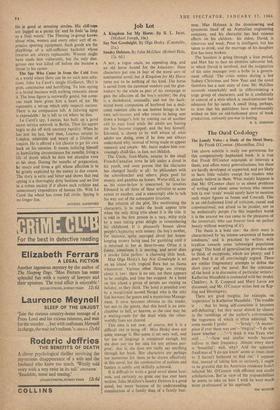The Ould Codology
THE above subtitle is really too portentous for this comparatively haphazard book. It is true
that Frank O'Connor expounds at intervals a thesis, and offers many generalisations; but these are hardly developed or supported, and are likely to have little validity except for readers who already believe in them. What mainly happens is that Mr. O'Connor chats to us about problems of writing and about some writers who interest him (a real 'study' would surely have to mention such major figures as James and Conrad). This is an old-fashioned kind of criticism, casual and conversational, not afraid to be jocular, nor to be aesthetically purple ('in this imperfect world it is the nearest we can come to the pleasures of the immortals, who can forever look on perfect beauty without wearying of it').
The thesis is a bold one: the short story is characterised by 'an intense awareness of human loneliness,' and is practised by writers with loyalties towards some 'submerged population group.' This kind of generalisation provokes one to think of exceptions, which are plenty; and I don't find it at all convincingly argued. There are similar fragmentary attempts to define the short story and the novel. But the substance of the book is in discussion of particular writers: Katherine Mansfield is contrasted with her model, Chekhov; A. E. Coppard and Mary Lavin are discussed; and Mr. O'Connor writes best on Kip- ling and Hemingway.
There are good insights; for example, on 'experience' in Katherine Mansfield: 'The trouble is . . . that by being self-conscious it becomes self-defeating'; but they occur almost by chance in the ramblings of the author's conversation, the vagueness of which is often admitted. 'In some moods I prefer . . .'—`lovely'—`A master- piece if ever there was one'—`magical"---1 do not
know whether . . think it was Yeats who said . .'—these and similar words become tedious in their frequency. Almost every story is 'beautiful': well, why? And the apparent frankness of 'I do not know' seems at times close to '1 haven't bothered to find out.' I suppose that, instead of taking him so seriously, I ought to be grateful that his American residence hasn't infected Mr. O'Connor with efficient and sterile scholasticism. But in view of the responsibilities he seems to take on here I wish he were much more professional in his approach.
JIM HUNTER


































 Previous page
Previous page